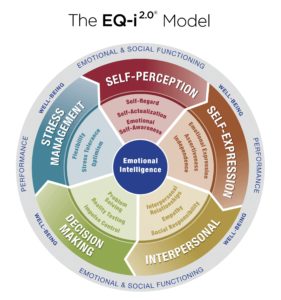Emotional Intelligence (EQ) Assessments Put To Work

MICHELE BURCH REID, MS FOUNDER OF LCI
One of my favorite strategies to use for Organizational Effectiveness and Personal Development is Emotional Intelligence Training.
Emotional Intelligence is a set of emotional and social skills that influence the way we perceive and express ourselves, develop and maintain social relationships, cope with challenges, and use emotional information in an effective and meaningful way.
The EQ-i 2.0 measures emotional intelligence (EI) and how it can impact people and the workplace by measuring our mastery of 15 skills. These 15 skills are divided into 5 categories/composites.
5 Composites of Emotional Intelligence
Self-Perception: How well you know yourself. This scale reveals how confident you are, how well you know and recognize your own emotions, and what influences them, as well as how willing you are to learn more about yourself and your emotional influences.
Self-Expression: How well you express yourself. It assesses your potential and ability to remain self-directed and openly expressive thoughts and feelings while communicating these feelings in a constructive and socially acceptable way.
Interpersonal: How well you manage relationships. This composite measures our ability to develop and maintain relationships based on trust and compassion; articulate an understanding of another’s perspective; and act responsibly while showing concern for others, a team, or a greater community/organization.
Decision Making: How well you use emotional information in the decision-making process. This scale reveals how well we understand the impact emotions have on decision making, including the ability to resist or delay impulses and remain objective so to avoid rash behavior and ineffective problem-solving.
Stress Management: How well you cope with emotions associated with change and unfamiliar or unpredictable circumstances while remaining hopeful about the future and resilient in the face of setbacks and obstacles.
The best part is that all of these Emotional Intelligence Skills can be completely learned, developed, and coached. I have seen the power of doing so. It is one of my greatest joys to see the impact that Emotional Intelligence training makes on my clients. It truly changes their lives in the most powerful and meaningful ways. I’ve seen clients take their power back because they have learned to set and keep boundaries in healthy ways. I’ve seen clients lead teams in greater capacities and in more joyful connections because they have learned the power of empathy. And the list goes on and on.
More From Michele
The Helper’s High: Health benefits of giving and volunteering
Giving to others - it’s not just good for the receiver. It’s also good for the giver. Giving can stimulate your brain's mesolimbic pathway, or reward center while releasing endorphins. This can lead to a “helper's high” that boosts self-esteem, elevates happiness, and...
The Impact of Play on Our Mental Health
Playtime? Seriously, for adults? Isn’t that being lazy? Isn’t that for the retired or for kids? Studies show that having regular segments of playtime can have a strong positive contribution to our mental health. Especially, nonconstructive playtime. What is meant by...
Creating A Relaxed State Of Being For Yourself And Others
Watch this video of my horse relaxing his head when I use a relaxation technique of deep cleansing exhalation. A horse will lower their head when they feel relaxed. Was I successful? Many of you that follow me know that one of the ways I “fill my soul” is...




